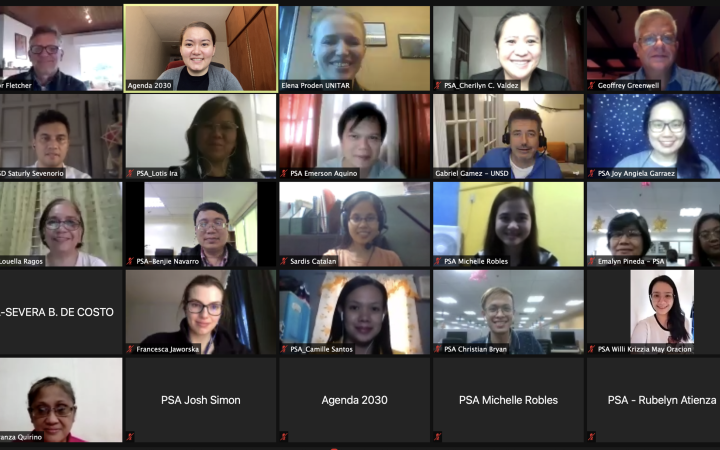11 December 2020, Geneva, Switzerland - On three dates in December 2020 (7, 10, 11), UNITAR and UN Statistics Division hosted an online workshop for the Philippine Statistics Authority (PSA) on the uses and applications of the updated StaTact online tool for resolving short-term tactical data problems.
The workshop was action-oriented, designed to apply StaTact as a pilot to a number of PSA priorities and develop realistic action plans that the PSA could then go on to implement. Prior to the workshop, the PSA submitted some real-life problems they were facing, and participants were split up into working groups to focus on solving these problems with StaTact throughout the workshop.
Following a welcome message by Ms. Minerva Eloisa P. Esquivias, OIC Deputy National Statistician with the Philippine Statistics Authority, and an introduction to the workshop objectives by Ms. Elena Proden, Senior Specialist with the Strategic Implementation of the 2030 Agenda Unit at UNITAR, Mr. Gabriel Gamez, Inter-regional Advisor at UN Statistics Division presented on the principles and underlying models of the StaTact platform – GAMSO and GSBPM – that help structure StaTact root cause analysis around governance and data process issues.
Reflecting this wide applicability of the StaTact tool, the problems brought by PSA to the workshop were related both to data collection and process issues and to governance. Nonetheless, when discussing the development of problem statements, it was noted that problem statements should always be formulated around data problems rather than policy since StaTact is a tool designed to deal primarily with data collection and processing problems that may or may not have their roots in a governance problem.
In four working groups, the participants from PSA formulated problem statements and business cases to begin the process of using StaTact to solve the problems they had brought to the workshop.
On the second day of the workshop, participants began stage two of the StaTact process, the problem analysis. Designed to identify the root cause of problems using a problem tree analysis, this stage applies the conceptual models GAMSO and GSBPM that had been explained by Mr. Gabriel Gamez on the first day and places a strong focus on prioritization and consultation as crucial tools to narrow down a root cause.
The final day of the workshop focused on the development of Action Plans, stage three of StaTact. The presentation by Trevor Fletcher, consultant at UNITAR, emphasized how an action plan is a powerful tool for identifying and communicating with important stakeholders, supporters, and champions for the successful resolution of problems. The workshop closed with a brief introduction to the final stage of the StaTact process, implementation, highlighting the organizational and coordination power of StaTact to see data problems all the way through to resolution and evaluation.
The workshop provided a hands-on introduction to the uses of StaTact for the Philippine Statistics Authority, and moving forward it was agreed that UNITAR can continue to provide support to the working groups to finalize their action plans, as well as potentially offer train the trainer sessions to further disseminate knowledge of the use of StaTact in the broader statistical system in The Philippines.
For more information about StaTact, please contact a2030@unitar.org.


